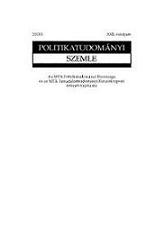Generációk a történelemben és a társadalomban. Generációs politikai attitűdök és részvételi minták történeti-szociológiai.Megközelítésben
GENERATIONS IN HISTORY AND SOCIETY. POLITICAL ATTITUDES AND PATTERNS OF PARTICIPATION IN A HISTORICAL SOCIOLOGICAL APPROACH
Author(s): Péter Róbert, Tibor ValuchSubject(s): Politics / Political Sciences
Published by: MTA Politikai Tudományi Intézete
Keywords: Generations; elite generations; political participation; attitudes; cohort-analysis
Summary/Abstract: In this paper the question is asked whether it is possible to attribute organisational and infl uencing role to groups emerging on a generational basis in a political and social sense in the Hungary of the recent past and present. How far and to what extent does a generational community, or getting separated from a generation infl uence the political behaviour, political attitude and its changes of the various social and elite groups? For this purpose the fi rst part of the paper lays the foundations of the empirical analysis of generations of (social) history and of empirical research. In this part we mostly deal with the topic in a historical approach, also referring to aspect that cannot be studied on the basis of the available empirical data. Thus the role of the various historical events, experiences and processes is studied in the organisation and articulation of generations, in the emergence and elimination of the elite groups of generations. Finally, we reach a typology of generations as well that would separate the generations from one another on the basis of historically evolved patterns. In the second part of the paper an analysis of generations is done with the help of statistical tools on survey data, defi ning the historically delineated generations empirically. During the course of the analysis two issues are studied in the ESS and ISSP data base pertaining to election participation and to the perception of social confl icts. These issues are studied from the angle of changes in time, with special reference to differences among generations, and also the effect of the ageing of members of generations on political participation and on attitudes. The specifi c empirical analysis seeks an answer whether it is possible to fi nd differences fi t for analysis of changes taking place in the contemporary Hungarian society in historical and individual time.
Journal: Politikatudományi Szemle
- Issue Year: 2013
- Issue No: 4
- Page Range: 116-139
- Page Count: 24
- Language: Hungarian

